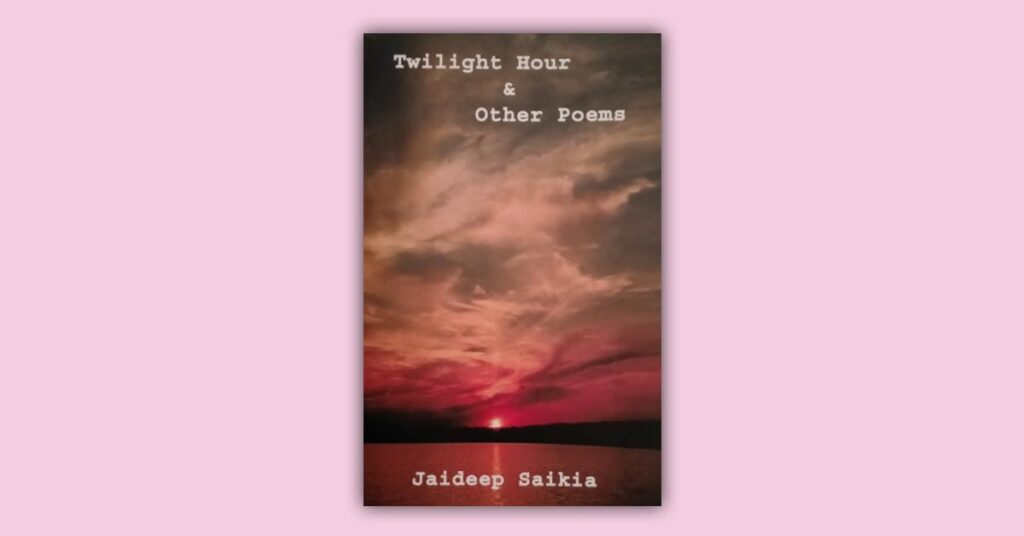Dr. Ananda Bormudoi

Jaideep Saikia has written poems in English and in a decade he has published quite a few individual collections. Some of his collections are Twilight Hours and Other Poems (2017); The Abandoned Tree (2021); Neruda or Nobody (2021); Quarter to Eight (2021); Echoes of Agony (2022) and Susupti (2021). The last of these collections is a translation of fifty two poems into Assamese done by four translators.
Jaideep writes poems, like many other poets and artists, to transform suffering into art form. More perfect the artist, as Eliot said, more separate will be the man who suffers from the mind that creates. Jaideep, however, does not begin with any pre-conceptions of poetry. A poet and reader have to share a common convention for communication. Jaideep’s poems, from this point of view, are a class by themselves. In the author’s note to Twilight Hour and Other Poems, the poet writes, “Indeed, throughout my uninspiring life I have only been subject to scorn, ridicule and derision. As a matter of fact, contempt has come my way even when I was sprightly and could ably participate in the uses of this world.” This sense of being left out in the cold, ignored and given up is central to the poems of Jaideep. The poet feels that the story of his life has become dreary. The poet finds that his situation of life resembles fairly closely with some of the situations and events of Shakespearean characters or the speaking voice of some sonnets. An example might illustrate the point.
Shakespear’s sonnet 29 begins, “When in disgrace with fortune and men’s eyes/ I all alone beweep my outcast state” and the speaker is struck by self remorse in the condition of being outcast, forsaken, rejected. This state corresponds to the sense of isolation and abandonment of the Assamese poet. The sonnet ends with an ironic reversal. When the speaker remembers his friend’s love for him he feels so rich that he would not exchange it with those of kings, “For thy sweet love remembered such wealth brings/That then I scorn to change my state with kings.” Poet Jaideep has been helped by his friends to come out of his loneliness, despair and dejection. Their imperative was to transmute suffering into art. There comes the question of impersonality in transmuting suffering into poetry. Eliot discussed impersonality in ‘Tradition and Individual Talent’. In the preface to the Lyrical Ballads Wordsworth defined poetry as spontaneous overflow of powerful feelings and emotions recollected in tranquility. Eliot said that poetry is not a turning loose of emotion, it is an escape from emotion. It is not an expression of personality but an escape personality. Emotions which a man experiences and emotions expressed in poetry may not be the same. As Eliot says, an emotion which has its life in the poem may not be there in the history of the poet.
Jaideep’s poems deal with the seamy side of life. The world depicted in the poems is dull, dreary, arid and dark. The first poem of Twilight Hours sets the mood and tone. It is not only barren, arid and unproductive but also terrible and frightening. This is a dark underworld of the occult, witchcraft, sorcery, mesas suggesting aridity and shamans who practice trance and claim divinity. As the poet finds, black act or sorcery has been there in the primordial images or the collective unconscious of men. The poet knows that the Roman god Bacchus is the Greek god Dionysus, who is the god of wine and fertility. But violent transformations have led the poet to the doorway of the dark underworld. The poet has explored the mythic world of the west and east for his poetic resources and refers to goddess Kali and his uncertain libido. The poet is actually uncertain how far his libido works as a component of his life instinct.
The poet does not believe that he has shaped his destiny or he has steered clear the boat of his life towards a desired goal. His sufferings are a result of what he did in the past lives. Such knowledge also refers to the occult. A summary of all that he did in the past is masochism, a voluntary submission to pain. The poem ends with the chanting of the name of Mahakali.
In the poem ‘Night: Day’, the poetic environment is shaped by infidelity, incestuous relationship and total darkness. For the speaker in the poem ‘darkness is real’ and light is fantasy. Philosophically the poet dwells upon the conflict between what is in time and what is eternal.